- Home
- H. Rider Haggard
Child of Storm Page 3
Child of Storm Read online
Page 3
"Already the spear had begun to prick—look, here is the mark of it"—and opening his kaross he pointed to a little white line just below the breast-bone—"when a strange shadow thrown by the fire of the burning huts came between Bangu and me, a shadow as that of a toad standing on its hind legs. I looked round and saw that it was the shadow of Zikali, whom I had seen once or twice. There he stood, though whence he came I know not, wagging his great white head that sits on the top of his body like a pumpkin on an ant-heap, rolling his big eyes and laughing loudly.
"'A merry sight,' he cried in his deep voice that sounded like water in a hollow cave. 'A merry sight, O Bangu, Chief of the Amakoba! Blood, blood, plenty of blood! Fire, fire, plenty of fire! Wizards dead here, there, and everywhere! Oh, a merry sight! I have seen many such; one at the kraal of your grandmother, for instance—your grandmother the great Inkosikazi, when myself I escaped with my life because I was so old; but never do I remember a merrier than that which this moon shines on,' and he pointed to the White Lady who just then broke through the clouds. 'But, great Chief Bangu, lord loved by the son of Senzangakona, brother of the Black One (Chaka) who has ridden hence on the assegai, what is the meaning of this play?' and he pointed to me and to the two soldiers who held out my little arms.
"'I kill the wizard's cub, Zikali, that is all,' answered Bangu.
"'I see, I see,' laughed Zikali. 'A gallant deed! You have butchered the father and the mother, and now you would butcher the child who has slain one of your grown warriors in fair fight. A very gallant deed, well worthy of the chief of the Amakoba! Well, loose his spirit—only—' He stopped and took a pinch of snuff from a box which he drew from a slit in the lobe of his great ear.
"'Only what?' asked Bangu, hesitating.
"'Only I wonder, Bangu, what you will think of the world in which you will find yourself before to-morrow's moon arises. Come back thence and tell me, Bangu, for there are so many worlds beyond the sun, and I would learn for certain which of them such a one as you inhabits: a man who for hatred and for gain murders the father and the mother and then butchers the child—the child that could slay a warrior who has seen war—with the spear hot from his mother's heart.'
"'Do you mean that I shall die if I kill this lad?' shouted Bangu in a great voice.
"'What else?' answered Zikali, taking another pinch of snuff.
"'This, Wizard; that we will go together.'
"'Good, good!' laughed the dwarf. 'Let us go together. Long have I wished to die, and what better companion could I find than Bangu, Chief of the Amakoba, Slayer of Children, to guard me on a dark and terrible road. Come, brave Bangu, come; kill me if you can,' and again he laughed at him.
"Now, Macumazahn, the people of Bangu fell back muttering, for they found this business horrible. Yes, even those who held my arms let go of them.
"'What will happen to me, Wizard, if I spare the boy?' asked Bangu.
"Zikali stretched out his hand and touched the scratch that the assegai had made in me here. Then he held up his finger red with my blood, and looked at it in the light of the moon; yes, and tasted it with his tongue.
"'I think this will happen to you, Bangu,' he said. 'If you spare this boy he will grow into a man who will kill you and many others one day. But if you do not spare him I think that his spirit, working as spirits can do, will kill you to-morrow. Therefore the question is, will you live a while or will you die at once, taking me with you as your companion? For you must not leave me behind, brother Bangu.'
"Now Bangu turned and walked away, stepping over the body of my mother, and all his people walked away after him, so that presently Zikali the Wise and Little and I were left alone.
"'What! have they gone?' said Zikali, lifting up his eyes from the ground. 'Then we had better be going also, Son of Matiwane, lest he should change his mind and come back. Live on, Son of Matiwane, that you may avenge Matiwane.'"
"A nice tale," I said. "But what happened afterwards?"
"Zikali took me away and nurtured me at his kraal in the Black Kloof, where he lived alone save for his servants, for in that kraal he would suffer no woman to set foot, Macumazahn. He taught me much wisdom and many secret things, and would have made a great doctor of me had I so willed. But I willed it not who find spirits ill company, and there are many of them about the Black Kloof, Macumazahn. So in the end he said: 'Go where your heart calls, and be a warrior, Saduko. But know this: You have opened a door that can never be shut again, and across the threshold of that door spirits will pass in and out for all your life, whether you seek them or seek them not.'
"'It was you who opened the door, Zikali,' I answered angrily.
"'Mayhap,' said Zikali, laughing after his fashion, 'for I open when I must and shut when I must. Indeed, in my youth, before the Zulus were a people, they named me Opener of Doors; and now, looking through one of those doors, I see something about you, O Son of Matiwane.'
"'What do you see, my father?' I asked.
"'I see two roads, Saduko: the Road of Medicine, that is the spirit road, and the Road of Spears, that is the blood road. I see you travelling on the Road of Medicine, that is my own road, Saduko, and growing wise and great, till at last, far, far away, you vanish over the precipice to which it leads, full of years and honour and wealth, feared yet beloved by all men, white and black. Only that road you must travel alone, since such wisdom may have no friends, and, above all, no woman to share its secrets. Then I look at the Road of Spears and see you, Saduko, travelling on that road, and your feet are red with blood, and women wind their arms about your neck, and one by one your enemies go down before you. You love much, and sin much for the sake of the love, and she for whom you sin comes and goes and comes again. And the road is short, Saduko, and near the end of it are many spirits; and though you shut your eyes you see them, and though you fill your ears with clay you hear them, for they are the ghosts of your slain. But the end of your journeying I see not. Now choose which road you will, Son of Matiwane, and choose swiftly, for I speak no more of this matter.'
"Then, Macumazahn, I thought a while of the safe and lonely path of wisdom, also of the blood-red path of spears where I should find love and war, and my youth rose up in me and—I chose the path of spears and the love and the sin and the unknown death."
"A foolish choice, Saduko, supposing that there is any truth in this tale of roads, which there is not."
"Nay, a wise one, Macumazahn, for since then I have seen Mameena and know why I chose that path."
"Ah!" I said. "Mameena—I forgot her. Well, after all, perhaps there is some truth in your tale of roads. When I have seen Mameena I will tell you what I think."
"When you have seen Mameena, Macumazahn, you will say that the choice was very wise. Well, Zikali, Opener of Doors, laughed loudly when he heard it. 'The ox seeks the fat pasture, but the young bull the rough mountainside where the heifers graze,' he said; 'and after all, a bull is better than an ox. Now begin to travel your own road, Son of Matiwane, and from time to time return to the Black Kloof and tell me how it fares with you. I will promise you not to die before I know the end of it.'
"Now, Macumazahn, I have told you things that hitherto have lived in my own heart only. And, Macumazahn, Bangu is in ill favour with Panda, whom he defies in his mountain, and I have a promise—never mind how—that he who kills him will be called to no account and may keep his cattle. Will you come with me and share those cattle, O Watcher-by-Night?"
"Get thee behind me, Satan," I said in English, then added in Zulu: "I don't know. If your story is true I should have no objection to helping to kill Bangu; but I must learn lots more about this business first. Meanwhile I am going on a shooting trip to-morrow with Umbezi the Fat, and I like you, O Chooser of the Road of Spears and Blood. Will you be my companion and earn the gun with two mouths in payment?"
"Inkoosi," he said, lifting his hand in salute with a flash of his dark eyes, "you are generous, you honour me. What is there that I should love better? Yet," he a
dded, and his face fell, "first I must ask Zikali the Little, Zikali my foster-father."
"Oh!" I said, "so you are still tied to the Wizard's girdle, are you?"
"Not so, Macumazahn; but I promised him not long ago that I would undertake no enterprise, save that you know of, until I had spoken with him."
"How far off does Zikali live?" I asked Saduko.
"One day's journeying. Starting at sunrise I can be there by sunset."
"Good! Then I will put off the shooting for three days and come with you if you think that this wonderful old dwarf will receive me."
"I believe that he will, Macumazahn, for this reason—he told me that I should meet you and love you, and that you would be mixed up in my fortunes."
"Then he poured moonshine into your gourd instead of beer," I answered. "Would you keep me here till midnight listening to such foolishness when we must start at dawn? Begone now and let me sleep."
"I go," he answered with a little smile. "But if this is so, O Macumazana, why do you also wish to drink of the moonshine of Zikali?" and he went.
Yet I did not sleep very well that night, for Saduko and his strange and terrible story had taken a hold of my imagination. Also, for reasons of my own, I greatly wished to see this Zikali, of whom I had heard a great deal in past years. I wished further to find out if he was a common humbug, like so many witch-doctors, this dwarf who announced that my fortunes were mixed up with those of his foster-son, and who at least could tell me something true or false about the history and position of Bangu, a person for whom I had conceived a strong dislike, possibly quite unjustified by the facts. But more than all did I wish to see Mameena, whose beauty or talents produced so much impression upon the native mind. Perhaps if I went to see Zikali she would be back at her father's kraal before we started on our shooting trip.
Thus it was then that fate wove me and my doings into the web of some very strange events; terrible, tragic and complete indeed as those of a Greek play, as it has often done both before and since those days.
CHAPTER II
THE MOONSHINE OF ZIKALI
On the following morning I awoke, as a good hunter always should do, just at that time when, on looking out of the wagon, nothing can be seen but a little grey glint of light which he knows is reflected from the horns of the cattle tied to the trek-tow. Presently, however, I saw another glint of light which I guessed came from the spear of Saduko, who was seated by the ashes of the cooking fire wrapped in his kaross of wildcat skins. Slipping from the voorkisse, or driving-box, I came behind him softly and touched him on the shoulder. He leapt up with a start which revealed his nervous nature, then recognising me through the soft grey gloom, said:
"You are early, Macumazahn."
"Of course," I answered; "am I not named Watcher-by-Night? Now let us go to Umbezi and tell him that I shall be ready to start on our hunting trip on the third morning from to-day."
So we went, to find that Umbezi was in a hut with his last wife and asleep. Fortunately enough, however, as under the circumstances I did not wish to disturb him, outside the hut we found the Old Cow, whose sore ear had kept her very wide awake, who, for purposes of her own, although etiquette did not allow her to enter the hut, was waiting for her husband to emerge.
Having examined her wound and rubbed some ointment on it, with her I left my message. Next I woke up my servant Scowl, and told him that I was going on a short journey, and that he must guard all things until my return; and while I did so, took a nip of raw rum and made ready a bag of biltong, that is sun-dried flesh, and biscuits.
Then, taking with me a single-barrelled gun, that same little Purdey rifle with which I shot the vultures on the Hill of Slaughter at Dingaan's Kraal,[*] we started on foot, for I would not risk my only horse on such a journey.
[*—For the story of this shooting of the vultures by Allan Quatermain, see the book called "Marie."—EDITOR.]
A rough journey it proved to be indeed, over a series of bush-clad hills that at their crests were covered with rugged stones among which no horse could have travelled. Up and down these hills we went, and across the valleys that divided them, following some path which I could not see, for all that live-long day. I have always been held a good walker, being by nature very light and active; but I am bound to say that my companion taxed my powers to the utmost, for on he marched for hour after hour, striding ahead of me at such a rate that at times I was forced to break into a run to keep up with him. Although my pride would not suffer me to complain, since as a matter of principle I would never admit to a Kafir that he was my master at anything, glad enough was I when, towards evening, Saduko sat himself down on a stone at the top of a hill and said:
"Behold the Black Kloof, Macumazahn," which were almost the first words he had uttered since we started.
Truly the spot was well named, for there, cut out by water from the heart of a mountain in some primeval age, lay one of the most gloomy places that ever I had beheld. It was a vast cleft in which granite boulders were piled up fantastically, perched one upon another in great columns, and upon its sides grew dark trees set sparsely among the rocks. It faced towards the west, but the light of the sinking sun that flowed up it served only to accentuate its vast loneliness, for it was a big cleft, the best part of a mile wide at its mouth.
Up this dreary gorge we marched, mocked at by chattering baboons and following a little path not a foot wide that led us at length to a large hut and several smaller ones set within a reed fence and overhung by a gigantic mass of rock that looked as though it might fall at any moment. At the gate of the fence two natives of I know not what tribe, men of fierce and forbidding appearance, suddenly sprang out and thrust their spears towards my breast.
"Whom bring you here, Saduko?" asked one of them sternly.
"A white man that I vouch for," he answered. "Tell Zikali that we wait on him."
"What need to tell Zikali that which he knows already?" said the sentry. "Your food and that of your companion is already cooked in yonder hut. Enter, Saduko, with him for whom you vouch."
So we went into the hut and ate, also I washed myself, for it was a beautifully clean hut, and the stools, wooden bowls, etc., were finely carved out of red ivory wood, this work, Saduko informed me, being done by Zikali's own hand. Just as we were finishing our meal a messenger came to tell us that Zikali waited our presence. We followed him across an open space to a kind of door in the tall reed fence, passing which I set eyes for the first time upon the famous old witch-doctor of whom so many tales were told.
Certainly he was a curious sight in those strange surroundings, for they were very strange, and I think their complete simplicity added to the effect. In front of us was a kind of courtyard with a black floor made of polished ant-heap earth and cow-dung, two-thirds of which at least was practically roofed in by the huge over-hanging mass of rock whereof I have spoken, its arch bending above at a height of not less than sixty or seventy feet from the ground. Into this great, precipice-backed cavity poured the fierce light of the setting sun, turning it and all within it, even the large straw hut in the background, to the deep hue of blood. Seeing the wonderful effect of the sunset in that dark and forbidding place, it occurred to me at once that the old wizard must have chosen this moment to receive us because of its impressiveness.
Then I forgot these scenic accessories in the sight of the man himself. There he sat on a stool in front of his hut, quite unattended, and wearing only a cloak of leopard skins open in front, for he was unadorned with the usual hideous trappings of a witch-doctor, such as snake-skins, human bones, bladders full of unholy compounds, and so forth.
What a man he was, if indeed he could be called quite human. His stature, though stout, was only that of a child; his head was enormous, and from it plaited white hair fell down on to his shoulders. His eyes were deep and sunken, his face was broad and very stern. Except for this snow-white hair, however, he did not look ancient, for his flesh was firm and plump, and the skin on his cheeks an
d neck unwrinkled, which suggested to me that the story of his great antiquity was false. A man who was over a hundred years old, for instance, surely could not boast such a beautiful set of teeth, for even at that distance I could see them gleaming. On the other hand, evidently middle age was far behind him; indeed, from his appearance it was quite impossible to guess even approximately the number of his years. There he sat, red in the red light, perfectly still, and staring without a blink of his eyes at the furious ball of the setting sun, as an eagle is said to be able to do.
Saduko advanced, and I walked after him. My stature is not great, and I have never considered myself an imposing person, but somehow I do not think that I ever felt more insignificant than on this occasion. The tall and splendid native beside, or rather behind whom I walked, the gloomy magnificence of the place, the blood-red light in which it was bathed, and the solemn, solitary, little figure with wisdom stamped upon its face before me, all tended to induce humility in a man not naturally vain. I felt myself growing smaller and smaller, both in a moral and a physical sense; I wished that my curiosity had not prompted me to seek an interview with yonder uncanny being.

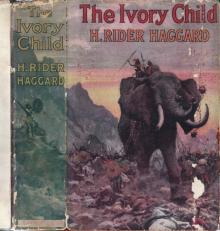 The Ivory Child
The Ivory Child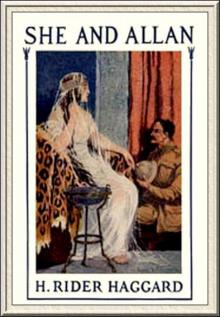 She and Allan
She and Allan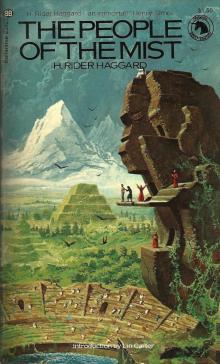 The People of the Mist
The People of the Mist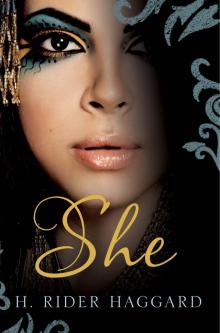 She
She Morning Star
Morning Star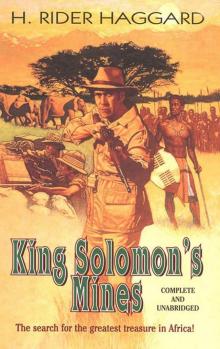 King Solomon's Mines
King Solomon's Mines She: A History of Adventure
She: A History of Adventure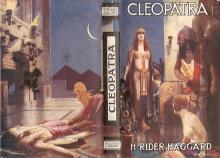 Cleopatra
Cleopatra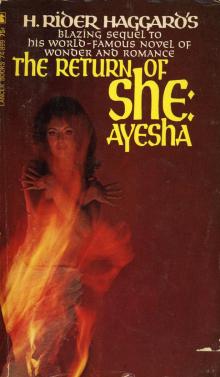 Ayesha, the Return of She
Ayesha, the Return of She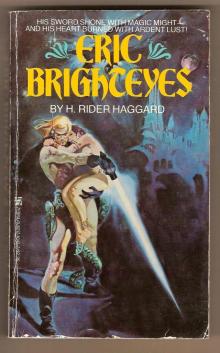 Eric Brighteyes
Eric Brighteyes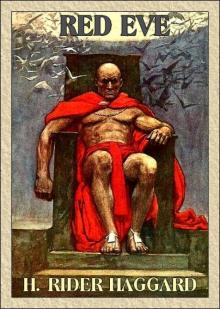 Red Eve
Red Eve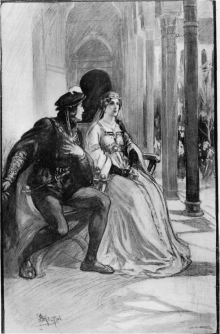 Fair Margaret
Fair Margaret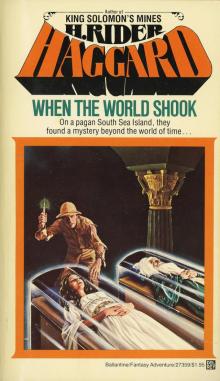 When the World Shook
When the World Shook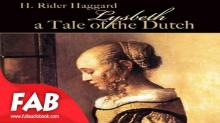 Lysbeth, a Tale of the Dutch
Lysbeth, a Tale of the Dutch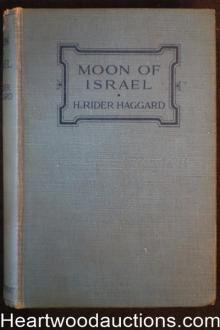 Moon of Israel: A Tale of the Exodus
Moon of Israel: A Tale of the Exodus Long Odds
Long Odds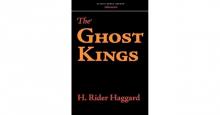 The Ghost Kings
The Ghost Kings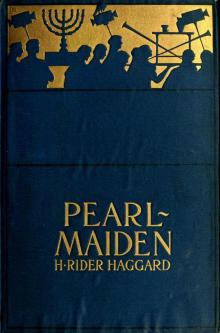 Pearl-Maiden: A Tale of the Fall of Jerusalem
Pearl-Maiden: A Tale of the Fall of Jerusalem Allan and the Holy Flower
Allan and the Holy Flower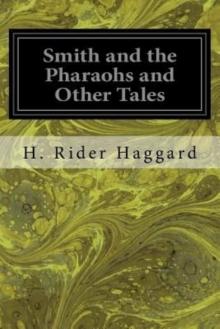 Smith and the Pharaohs, and other Tales
Smith and the Pharaohs, and other Tales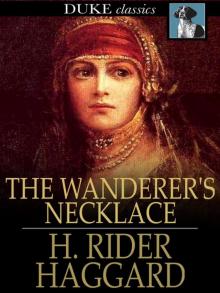 The Wanderer's Necklace
The Wanderer's Necklace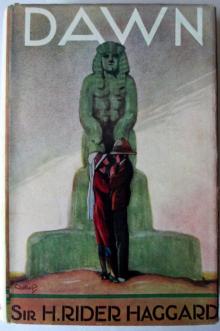 Dawn
Dawn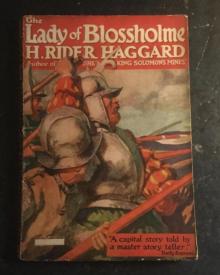 The Lady of Blossholme
The Lady of Blossholme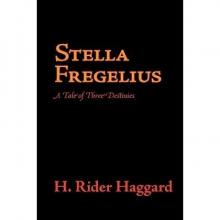 Stella Fregelius: A Tale of Three Destinies
Stella Fregelius: A Tale of Three Destinies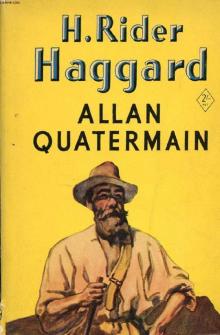 Allan Quatermain
Allan Quatermain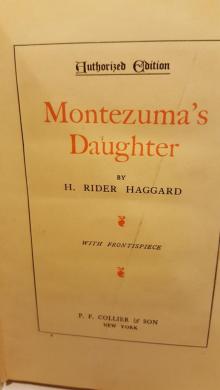 Montezuma's Daughter
Montezuma's Daughter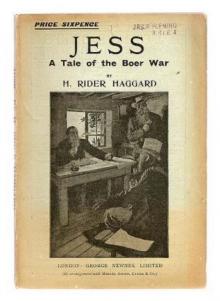 Jess
Jess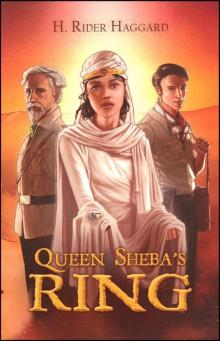 The Brethren
The Brethren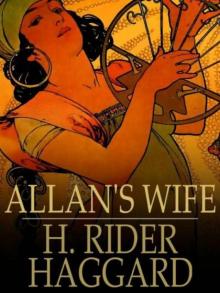 Allan's Wife
Allan's Wife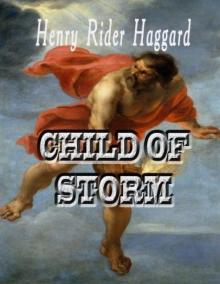 Child of Storm
Child of Storm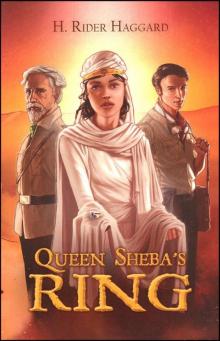 Queen Sheba's Ring
Queen Sheba's Ring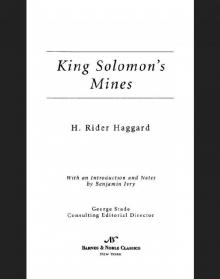 King Solomon's Mines (Barnes & Noble Classics Series)
King Solomon's Mines (Barnes & Noble Classics Series)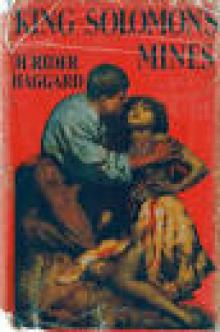 Complete Allan Quatermain Omnibus - Volumes 1 - 10
Complete Allan Quatermain Omnibus - Volumes 1 - 10